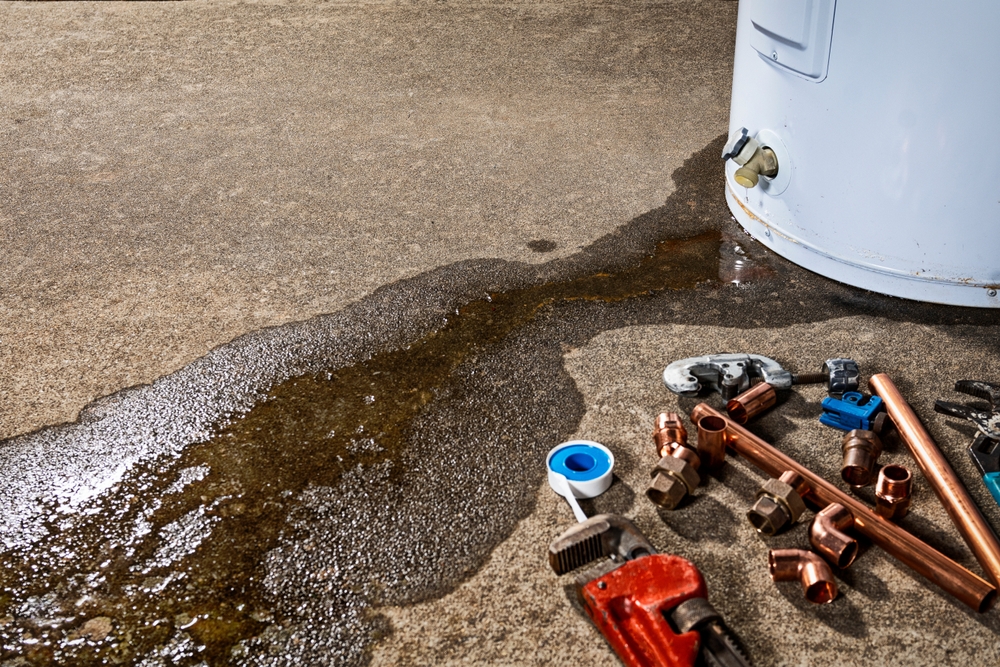What happens when your water heater starts to leak? Many homeowners might think a small drip is no big deal. But could it actually lead to a major failure? Water heater leaks are among the top causes of water damage at home. They can cost a lot, usually around $4,444 after insurance deductibles.
Things like sediment buildup, rust, and too much pressure inside can weaken a water heater. So, the big question is: will a leaking water heater burst?
Key Takeaways
- Water heater leaks are one of the top sources of residential water damage.
- Sediment buildup, rust corrosion, and excessive internal pressure can increase the risk of a water heater burst.
- Repairing water damage typically costs around $4,444 after insurance deductibles.
- Dismissing small leaks can lead to significant damage and possible bursts.
- Understanding signs of water heater leaks can help prevent serious issues.
Understanding the Dangers of a Leaking Water Heater
Knowing why a water heater leaks can help homeowners avoid expensive repairs and safety risks. Problems like sediment buildup, rust, and high pressure can cause leaks.
Causes of Water Heater Leaks
Sediment buildup is a big reason for water heater leaks. Minerals from hard water settle at the bottom, blocking the heating element. This makes the heater work too hard and can damage it.
Rust also causes leaks. It happens when the anode rod wears out. High pressure, from a too-hot setting, can stress the tank walls and lead to leaks too.
Immediate Risks of a Leaking Water Heater
Leaks can damage your floors, walls, and more. They can also pose electrical dangers if water hits electrical parts. For gas heaters, leaks can cause fires or explosions.
How Sediment Accumulation Can Lead to Bursts
Sediment buildup makes the heater work harder, wearing it down faster. It traps heat, making the heating element work longer. This increases pressure and can weaken the tank, leading to bursts.
Fixing these issues early can stop big problems later.
- Regularly flush the tank to remove sediment.
- Replace the anode rod to prevent rust.
- Monitor and adjust the thermostat to maintain a safe temperature.
Will a Leaking Water Heater Burst?
Knowing the signs of a water heater about to burst is key for homeowners. Look out for certain signs to avoid a dangerous situation.
Indicators of an Impending Burst
One sign is when the temperature and pressure (T&P) relief valve keeps going off. This valve is meant to release extra pressure. If it’s always active, it means your water heater is under too much pressure, which can cause it to burst.
Rust-colored water from your faucets is another warning sign. It means the tank is corroding inside, which weakens it. Also, if you hear popping or knocking sounds from the tank, it’s a bad sign. These sounds usually mean there’s sediment buildup, which can lead to a burst.
Preventive Maintenance Tips
Regular maintenance is the best way to stop a water heater from bursting. Here are some important tips:
- Drain the Tank Regularly: Draining your water heater tank often removes sediment. This helps prevent too much pressure and a burst.
- Check and Replace the Anode Rod: The anode rod helps stop rust in the tank. Check it every year and replace it if it’s badly corroded.
- Regulate the Water Temperature: Keeping the water between 120-125 degrees Fahrenheit helps keep the tank’s pressure safe. This reduces the chance of a burst.
- Schedule Professional Inspections: Getting a certified technician to check your water heater regularly can catch problems early. This keeps it running safely and efficiently.
Conclusion
A leaking water heater is a serious issue that needs quick action. It can burst, causing big problems. By watching it closely and following safety tips, you can avoid this.
Regular checks can spot problems early. This lets you fix them before they get worse. Keeping the water heater at the right temperature and flushing it often helps too.
These steps make your water heater last longer and keep your home safe. It’s important for homeowners to take care of their appliances. Regular checks and maintenance are key.
The aim is to be ready and prevent problems. By following safety tips, you lower the risk of a burst. This brings peace of mind and protects your home from water damage.







